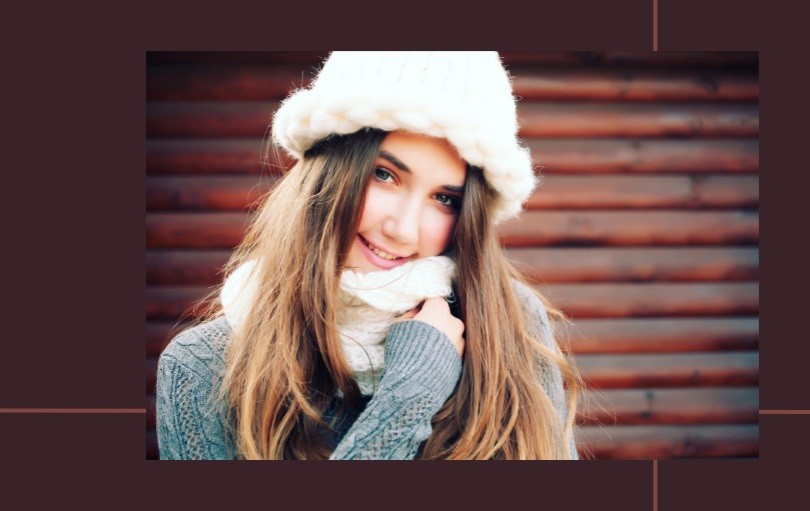Last Updated on March 28, 2025
Wearing a beanie does not cause hair loss, contrary to popular belief. Beanies cannot damage hair follicles or restrict blood flow to the scalp, which are both leading causes of hair loss.
Many people believe that wearing a beanie or other hat for an extended period can lead to hair loss. There is no conclusive evidence to support this claim. Hair loss is usually caused by genetics, medical conditions, or lifestyle factors, such as stress or poor nutrition.
While wearing a tight hat or beanie may cause some temporary hair flattening, it won’t cause any permanent damage to your hair or hair follicles. In fact, wearing a beanie may even protect your hair from the sun and other environmental damage.
The Relationship Between Beanies And Hair Loss
Beanies are often viewed as fashionable accessories during colder months, but there has been some speculation regarding their effects on hair loss. Some individuals believe that wearing a beanie could lead to hair loss, while others are skeptical about this claim.
In this blog post, we will explore the relationship between beanies and hair loss, unpacking any scientific background that might help us to understand this topic better.
Scientific Background On The Relationship Between Hair Loss And External Factors
Hair loss can be attributed to a variety of factors, including genetics, hormones, and certain medical conditions. Surprisingly, it can also result from external factors such as diet, stress, and even the use of certain hair products. But what about the use of beanies?
Is it possible that wearing a beanie for extended periods could cause hair loss?
Interestingly, scientific research has not found evidence to suggest that beanies lead to hair loss. A number of studies have examined the relationship between hair loss and hat-wearing, including the use of beanies. The overarching conclusion seems to be that there is no direct correlation between the two.
It’s important to remember that hair follicles are incredibly resilient and can withstand a significant amount of external pressure.
Related: Is Salt Water Good for Your Hair?
Clarification On What Exactly A Beanie Is And How It Could Potentially Affect Hair Growth
A beanie is a type of hat that fits snugly over the head and ears, and it is typically made from materials such as wool, acrylic yarn, or cotton. These materials can help to retain heat, which is why beanies are often worn in cold weather.
There are a few potential ways that a beanie could indirectly affect hair growth:
- If a beanie is worn too tightly, it could lead to traction alopecia, which is hair loss caused by consistent pulling or tension on the hair.
- If a beanie is worn for extended periods without being removed, it could lead to an accumulation of sweat, dirt, and bacteria on the scalp. This can cause irritation, inflammation, and even infection which can damage hair follicles over time.
- If a beanie is not washed often or is shared with others, it can harbor fungus, lice or other parasites which can cause hair loss.
It’s important to note that the likelihood of these potential side effects occurring is low. Additionally, it’s crucial to take proper care of one’s hair and scalp by washing the beanie regularly, keeping it loose to prevent traction alopecia, and removing it occasionally to allow the scalp to breathe.
Evidence does not support the notion that wearing a beanie inherently causes hair loss. Wearing a beanie is a matter of personal choice and style, and as long as one takes proper care of their hair and scalp while wearing a beanie, hair loss should not be a concern.
What Does Research Tell Us About Wearing A Beanie And Hair Loss?

Hair growth is a complex process influenced by genetics, nutrition, and external factors. Hair has a three-stage cycle: anagen, catagen, and telogen. During the anagen phase, hair grows actively. The catagen phase is a transitional phase where growth stops. Finally, the telogen phase is when the hair rests, sheds, and the follicle remains dormant till a new cycle begins.
Factors that influence hair loss include age, genetics, stress, hormone imbalance, and external factors, such as diet, hair treatments, and certain headwear.
Evidence Supporting The Idea
While not a direct cause, research suggests that wearing tight headwear like beanies for extended periods can contribute to hair loss. The scalp needs adequate blood flow to nourish the hair and maintain healthy follicles. Wearing tight headwear can reduce blood circulation and lead to traction alopecia, a type of hair loss caused by frequently pulling the hair follicles.
Here are some supporting pieces of evidence:
- Studies have found that individuals who wear tight headwear for extended periods have a higher chance of hair loss than those who do not.
- Professionals who frequently wear tight headwear such as athletes, soldiers and are at a higher risk of traction alopecia.
- Various dermatologists believe that the pressure caused by wearing tight headwear like beanies can lead to hair loss.
Evidence That Contradicts The Idea
Some researchers argue that the evidence against the idea that wearing beanies can cause hair loss is not strong enough. Here are some points to consider that may contradict the idea that wearing beanies can cause hair loss:
- Hair loss can occur for numerous reasons, and genetics, stress, or medication use are among the major factors.
- There is no direct evidence to prove that wearing a beanie alone can cause hair loss. Observational studies have attempted to establish a link, but conclusive evidence is limited.
- Tight headwear, including beanies, may cause hair thinning in some individuals, but it is not clear if they cause hair loss.
Wearing a beanie can have adverse effects on hair health, but it is not a direct cause of hair loss. The available evidence suggests that hair loss can be caused by various factors, and genetics is often the most significant contributor.
If you are concerned about hair loss, speak to a medical professional to get personalized recommendations.
Related: Biotin VS Collagen For Hair Growth?
So, Is It Worth It To Wear A Beanie?
If you’re a fan of beanies, you may have heard rumors that wearing them too often can lead to hair loss. But is there any truth to these claims?
While wearing a beanie won’t directly cause hair loss, it may contribute to the conditions that lead to hair loss. The friction from the hat can damage hair, and the warm, moist environment under the hat can encourage the growth of bacteria on the scalp, leading to dandruff and other scalp issues that may weaken hair roots.
If you love wearing beanies, there’s no reason to avoid them altogether. Here are some suggestions for how to mitigate any potential negative effects:
- Choose beanies made from soft fabrics like cotton or cashmere to minimize friction on the scalp
- Avoid wearing beanies for long periods, and take breaks throughout the day to let your scalp breathe
- Keep your scalp and hair clean and healthy by washing regularly and using mild shampoos and conditioners
Suggestions For Other Steps
While wearing a beanie alone isn’t likely to cause hair loss, there are many factors that can contribute to the condition. Here are some tips for promoting healthy hair growth and preventing hair loss:
- Eat a balanced, nutritious diet rich in vitamins and minerals like iron, biotin, and zinc.
- Use gentle hair care products that don’t contain harsh chemicals or sulfates.
- Avoid tight hairstyles that pull on the scalp, like tight ponytails or braids.
- Don’t smoke, and limit alcohol consumption.
- Manage stress levels through activities like exercise, meditation, or yoga.
Hair Care Best Practices And Tips
Taking good care of your hair can make a big difference in its health and appearance. Here are some best practices for maintaining healthy hair:
- Wash hair regularly to remove dirt and oil buildup.
- Use a gentle shampoo and conditioner made for your hair type.
- Don’t rub hair dry with a towel; instead, gently pat it dry or let it air dry.
- Use a wide-toothed comb to detangle wet hair, starting at the ends and working your way up.
- Limit the use of heat styling tools like flat irons, curling irons, and blow dryers.
Advice On Lifestyles Choices
Many lifestyle factors can contribute to hair loss or affect hair growth. Here are some tips for making choices that support healthy hair:
- Exercise regularly to improve circulation and reduce stress.
- Get enough sleep each night to let your body repair and regenerate.
- Drink plenty of water to keep your body and hair hydrated.
- Manage stress levels through relaxation techniques like mindfulness or meditation.
- Talk to your doctor about any medications you take, as some can contribute to hair loss.
Signs Of Hair Loss And When To Talk To A Healthcare Provider
It’s normal to shed some hair every day, but if you notice significant hair loss or thinning, it’s important to talk to a healthcare provider. Signs of hair loss can include:
- More hair than usual comes out when you brush or wash your hair.
- Thinning hair or bald patches.
- A receding hairline.
- Changes in the texture or appearance of hair.
If you’re concerned about hair loss, talk to your healthcare provider about potential treatments. Options may include medications, topical treatments, or hair transplantation.
Related: Can You Reverse Grey Hair?
Frequently Asked Questions For Does Wearing A Beanie Cause Hair Loss?

Does Wearing A Beanie Cause Hair Loss?
No, wearing a beanie does not cause hair loss. It may cause temporary hair flattening but not hair loss.
Can Wearing A Tight Beanie Cause Hair Damage?
Yes, wearing a tight beanie for extended periods can cause hair breakage, but it usually depends on the material.
How Often Should I Wear A Beanie?
It’s best to wear a beanie only on cold or windy days to prevent hair damage. Avoid wearing a beanie for extended periods.
Should I Wear A Silk-Lined Beanie?
Silk-lined beanies can reduce the risk of hair damage. Silk will help protect hair from friction and static buildup.
How Can I Prevent Hair Damage When Wearing A Beanie?
Choose beanies with a loose fit and a soft, breathable material like cotton. Avoid wearing beanies for extended periods and take breaks to let your hair breathe.
Conclusion
Beanies are a staple in winter wear, and many people use them to keep their heads warm. The belief that beanies can cause hair loss has been a topic of discussion for a while. After conducting thorough research, we can conclude that wearing a beanie does not inevitably lead to hair loss.
As long as you don’t wear beanies too tightly and keep your scalp clean, beanies will not affect your hair growth. Other factors such as nutrition, genetics, and stress levels can play a role in hair loss. Wearing a beanie is safe, but taking care of your health and hair deserves attention.
By maintaining a healthy lifestyle, you can positively influence your hair’s overall health and growth. So, go ahead and keep wearing your favorite beanies without worrying about hair loss!

